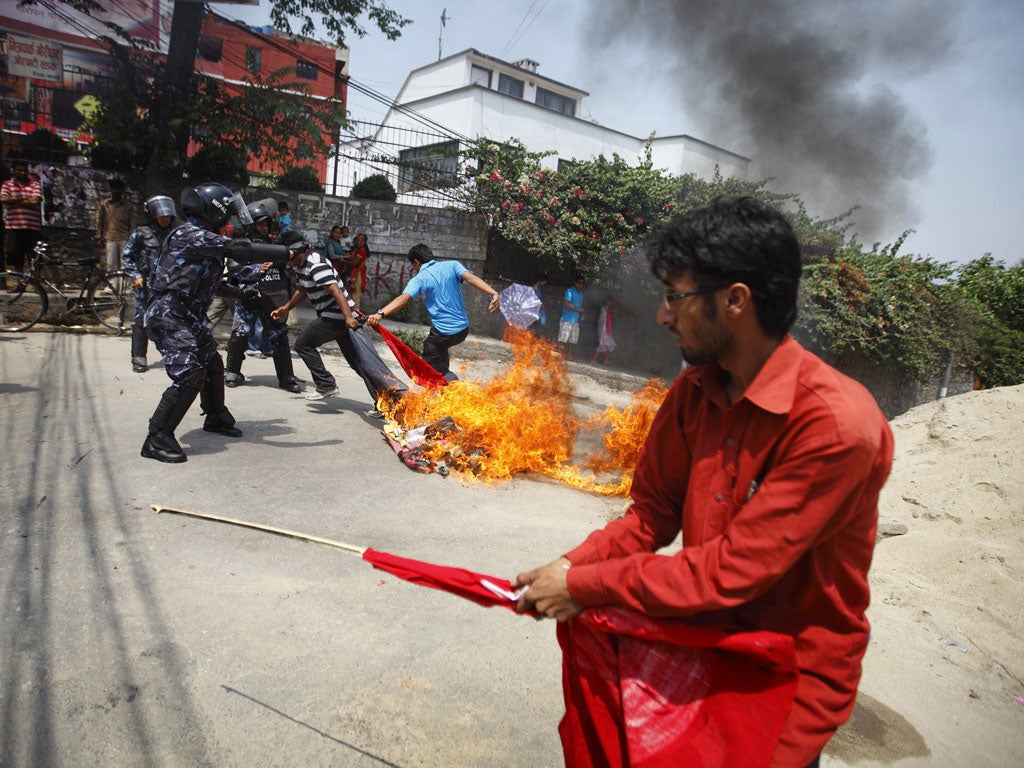Chaos looms in Nepal as parties fail to agree constitution
PM urged to resign after latest deadline is missed and rumours circulate of ousted king's return

Police and security services were on high alert yesterday as Nepal plunged into a fresh political crisis, after rival parties failed to agree a constitution and the prime minister announced new elections will take place later this year.
Four years after it was first tasked with agreeing a new constitution, the interim constituent assembly broke up on Sunday evening, having failed to reach agreement and missing its latest deadline, which had been extended several times.
Some political parties had wanted Prime Minister Baburam Bhattarai to again extend the assembly's deadline, but he declined to try and do so and instead announced that new elections will take place in November and that he will oversee a caretaker government until then. There were immediate calls for his resignation and police and security services were preparing for unrest after several parties called for rallies to protest at the prime minister's decision, and announced that they were leaving the coalition.
"We have no other option but to go back to the people and elect a new assembly to write the constitution," Mr Bhattarai insisted.
The developments are the latest in the country's stumbling steps as a young democracy emerging from a period of conflict.
It was only in 2006 that Maoist rebels were persuaded to end their decade-long insurrection and join the mainstream political process – a move that involved the country getting rid of its monarchy and becoming a republic. The Maoists won an election in 2008 and it is they who currently hold the premiership.
The main point of disagreement between the various parties appears to be the nature of the Nepali state itself. The Maoists, formally the Unified Communist Party of Nepal (Maoist) and some regional allies, want the country divided into up to 14 districts, many of them based on ethnic grounds. Meanwhile, the main two opposition parties, the Nepali Congress and the Communist Party of Nepal (Unified Marxist Leninist) have taken the opposite view.
From the outside, it might look as if the parties have put their own interests ahead of the well-being of the country. But issues such as federalism are crucial to a number of the smaller parties who win their support along ethnic lines and want to be seen to have delivered to their members, many of whom have for centuries lost out to the country's elite.
CK Lal, a leading analyst, said most major issues that were demanded by a 2006 popular uprising – the ousting of the monarchy, the move to a secular state and help for the most marginalised groups – had now been met. But the issue of federalism remained.
"You have those dominant groups who do not want to even talk about federalism and those previously marginalised groups who are demanding it," he said, speaking from Kathmandu.
Securing an agreement over a constitution was seen as being the conclusion of an interim period designed at solidifying details of Nepal's democracy and republican status. The failure to do so has instead created wide scale disappointment, so much so there are whispers that the country's former king may seek to make a comeback.
Join our commenting forum
Join thought-provoking conversations, follow other Independent readers and see their replies
Comments